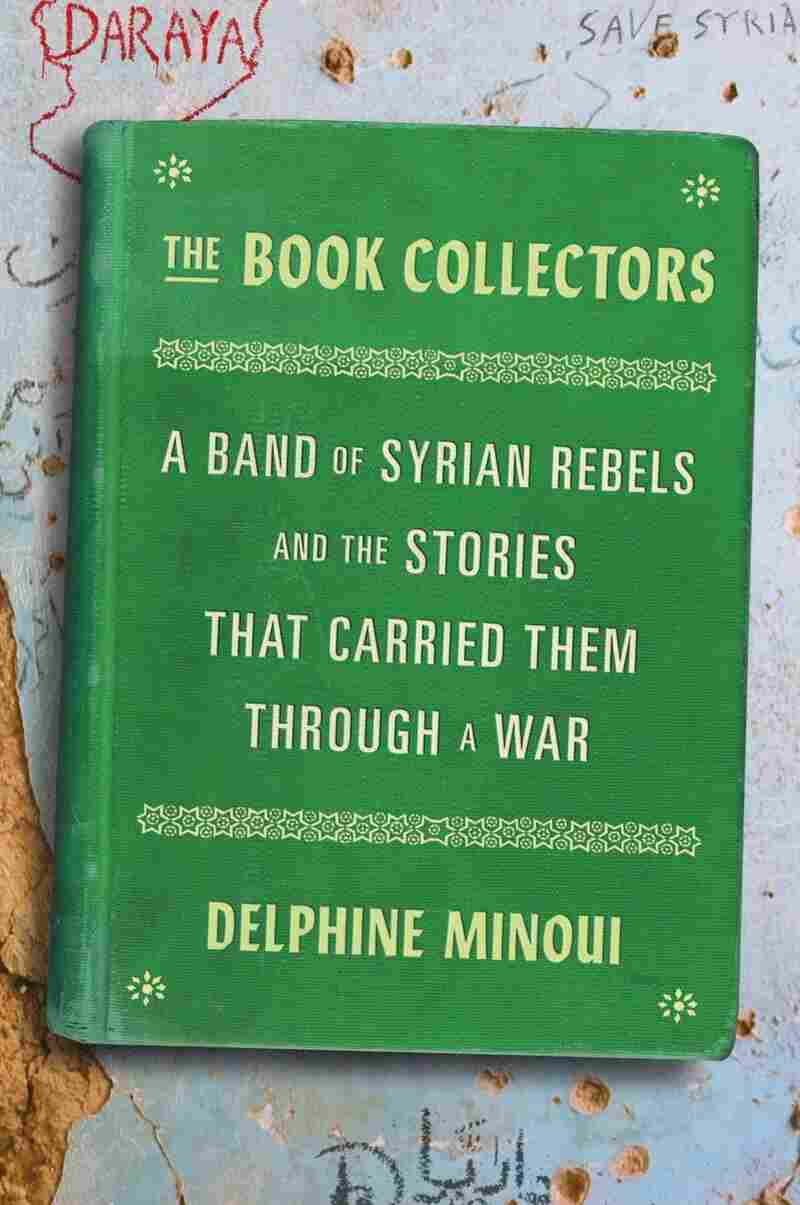
The Book Collectors: A Band of Syrian Rebels and the Stories That Carried Them Through a War, by Delphine Minoui Farrar, Straus and Giroux
Books have always gone to war, serving as comfort and distraction. And oftentimes, the most unexpected books have struck a chord in wartime.
For instance, who would've guessed that A Tree Grows in Brooklyn, Betty Smith's 1943 semi-autobiographical novel, would become one of the most popular books among servicemen in World War II, who received it as part of a massive book distribution program?
The Syrian resistance fighters whom reporter Delphine Minoui profiles in her new book, The Book Collectors, surprisingly, favored self-help literature. Their counterpart to A Tree Grows in Brooklyn is Stephen Covey's best-selling pop-psych Bible, The 7 Habits of Highly Effective People. "This book means so much to us," one young fighter tells Minoui. "It's our compass, in a way ..."
Minoui understands that Covey's book affirms the power of the individual, something these young men, raised under the repressive regime of Bashar al Assad, are fighting for. These men are from a suburb of Damascus called Daraya, which was the site of peaceful protests during the Arab Spring uprising of 2011.
Beginning in 2012, forces of the Assad regime laid siege to the town, pummeling it with barrel bombs, and sarin gas attacks; cutting off water, electricity and humanitarian aid — in short, inflicting the kind of determined total erasure of a city called "urbicide."
Minoui, a Middle East correspondent for Le Figaro who lives in Istanbul, was on her computer one night in 2015, scrolling through the Facebook site, "Humans of Syria," when she was stopped by a black-and-white photo. The caption read: "the secret library of Daraya."
In the photo, two young men in sweatshirts stand in a room lined with bookcases, packed tight. Her curiosity aroused, Minoui worked her contacts via Skype and WhatsApp to track down the photographer, a young man named Ahmad Muaddamani, one of the co-founders of the "secret library." He tells her an incredible story that Minoui, in turn, would spend years fleshing out.
Minoui, whose writing has been translated from the French by Lara Vergnaud, is an unadorned stylist. Occasionally, though, she comes up with a lyrical phrase that stops a reader short, such as when she refers to the photo that first caught her attention as depicting, "a fragile parenthesis in the midst of war."
The story behind that photo, as Minoui learns, is even more arresting. In late 2013, Ahmad, then in his early 20s and a committed resistance fighter, was called upon by his friends to help excavate the ruins of a house filled with books. Ahmad wasn't even a reader; the books he'd been assigned in school were propaganda. But when he picked up one of the rescued books and started reading, Ahmad said he felt: "The same sensation of freedom I felt at my first protest."
Ahmad and his comrades salvaged 6,000 books in one week; a month later, bulked out by other scavenging missions, this disparate collection of literature, theology, science and, yes, self-help, stood at 15,000. To preserve their find, the men carved out a library in the basement of an abandoned building. They built wooden shelves and cataloged the books. The library quickly became a gathering place, a mini-university in a city where almost all the professors had either been exiled, jailed or killed. In this refuge, Minoui says, people could experience the sensation of: "A page opening to the world when every door is locked."
The Book Collectors is itself a charged addition to the library of literary survival tales involving, not only the preservation of books, but the rescuing of the ideas they contain. I'm thinking of everything from Thomas Cahill's How the Irish Saved Civilization, about the remote libraries of monks in the so-called "Dark Ages," to Azar Nafisi's Reading Lolita in Tehran, to which Minoui's story is a kind of all-male companion piece.
In The Book Collectors, unlike these earlier accounts, the internet plays a key role in the rescue work, and not only by first alerting Minoui to the existence of the "secret library." Some of the resistance fighters become such avid readers that they download still more books on their cell phones, thus augmenting the holdings of their library.
Anyone who knows the history of current events in Syria won't be surprised to learn that the secret library doesn't survive, nor do all of those young men. The story of the secret library, however, is preserved in this slim, vivid account, when so much else in Daraya has turned to dust.
"story" - Google News
November 18, 2020 at 01:55AM
https://ift.tt/3lHbDdM
'The Book Collectors' Review: A True Story Of A Secret Wartime Library - NPR
"story" - Google News
https://ift.tt/2YrOfIK
https://ift.tt/2xwebYA
Bagikan Berita Ini














0 Response to "'The Book Collectors' Review: A True Story Of A Secret Wartime Library - NPR"
Post a Comment